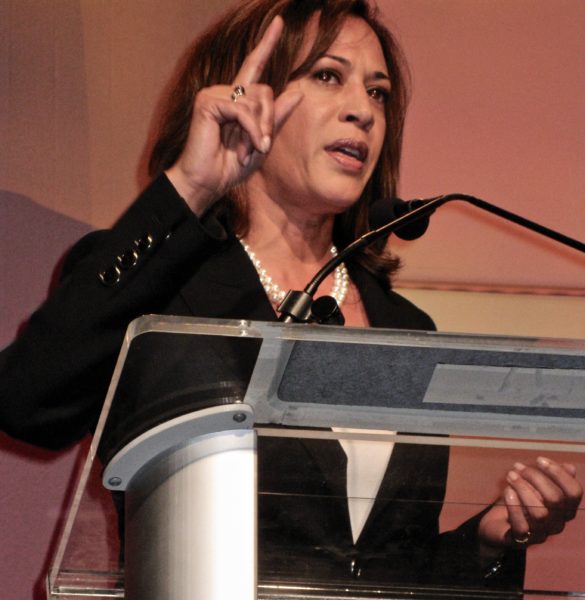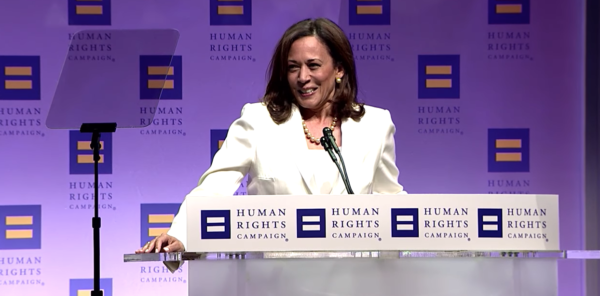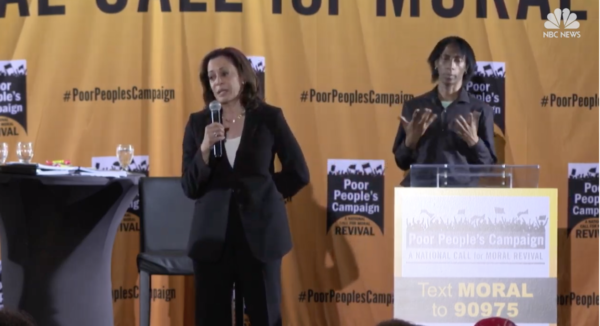News
Kamala Harris wants your vote


The conflict is internal. It’s a secret struggle, really, that Kamala Harris has been forced to face in public. The Democratic presidential candidate doesn’t like to brag. It’s unbecoming, it’s immodest, it places the individual ahead of the community. Instead, Harris, who was inculcated in the spirit of the 1960s civil rights and social and economic justice movements, profoundly believes in community and coalition building.
“That’s exactly how I was raised,” Harris tells the Los Angeles Blade in a June 18 phone interview. “It’s not about you. It’s about getting the job done.”
The job done of winning the presidency means not taking any group or voter for granted, including the LGBT community. Harris’ struggle to tout her own achievements, which she discusses in her memoir The Truths We Hold: An American Journey, stands in sharp contrast to the man she intends to defeat, Donald Trump, the biggest chest-pounding, klieg lights-seeking braggadocio con artist the world has seen in decades. Harris, a former district attorney and California attorney general who believes Trump is a racist, thinks the House should launch impeachment proceedings into the president’s illegal behavior. She also thinks Trump should be prosecuted after he leaves office.
Some wonder if Harris is “tough enough” to go up against Trump. They need only look at her precision prosecution of Attorney General Jefferson Beauregard Sessions during a Senate Intelligence Committee hearing. Despite being interrupted by her Republican colleagues, Harris forced the flabbergasted Sessions to throw his hands in the air. “I’m not able to be rushed this fast!” Sessions said, as if needing a fan and mint julep. “It makes me nervous.”

Or juxtapose a visibly frightened Trump crouching behind a lectern during a disturbance at a rally before four burly men rushed to his rescue—to Harris who was initially surprised but sat calmly when a white man rushed the stage, grabbed her microphone and had only black lesbian MoveOn.org communications director Karine Jean-Pierre for protection.
Harris calmly walked off the stage, smiling, while the man was hustled away. She then calmly returned to deliver her talk about pay equity. No one talks about the courage it takes for Harris to stand alone onstage, despite what one presumes is an ongoing avalanche of death threats from Trump supporters.
The field of 23 Democratic presidential contenders is expected to narrow after the June 26-27 debates. But while Harris is top-tier, she is not a shoo-in for the nomination, which is still a long ways away.
“I hate to say this—but we need a man. Nothing against her. I’m sure she’s smart and great. But I’m going with Joe Biden. He’s got thick skin and he’s the only one who can beat Trump,” one white gay man tells the Los Angeles Blade on background.
Biden’s “thick skin” is now under scrutiny. Though he had been advised against it, on Juneteenth, the former vice president cited working with notorious racist segregationist senators James Eastland (a Mississippi plantation owner who believed integration would lead to “”mongrelization”) and Herman Talmadge (who as Georgia governor closed schools rather than desegregate) as an example of civility and bipartisanship.
New Jersey Sen. Cory Booker, an African American presidential candidate, was offended and said Biden should apologize. Biden took umbrage and pushed back. “Cory should apologize,” Biden told reporters. “He knows better. There’s not a racist bone in my body; I’ve been involved in civil rights my whole career. Period. Period. Period.”
Harris said Biden’s remarks concerned her “deeply. If those men had their way, I wouldn’t be in the United States Senate and on this elevator right now,” she told Capitol Hill reporters.
It is unclear if Biden, the frontrunner in the race for the Democratic presidential nomination, will lose support as some younger progressive politicos claim he is “out of touch” with current sensibilities around race, while older politicos try to explain his gaffe.
Several younger LGBT voters support South Bend, Ind. Mayor Pete Buttigieg, who smartly talks about the future. They think Buttigieg, a vet who served in Afghanistan, can take down the bully Trump and shame him for ducking the Vietnam War. Buttigieg has stepped off the campaign trail to deal with the shooting of a black man by a while police officer in South Bend, which has resurrected past racial complaints over a housing policy. But Buttigieg will be standing next to Biden during the second Democratic debate on June 27, a visual that screams generational divide.
Harris will be standing next to Vermont Sen. Bernie Sanders and New York Sen. Kirsten Gillibrand.

California Attorney General candidate Kamala Harris with Equality California Executive Director Geoff Kors at an EQCA event (Photo by Karen Ocamb)
Harris will have a strong LGBT cheering section glued to TVs across California, including longtime friend Mark Leno, the first openly gay man elected to the State Senate who brought Harris to her first Human Rights Campaign gala in 1999 and Palm Springs City Councilmember Geoff Kors who, as executive director of Equality California, first introduced Harris to the broader LGBT community when she was the San Francisco DA running for attorney general.

Sen. Kamala Harris and Kate Kendell, Campaign Manager for
Take Back the Court, at a Pride event (Photo courtesy Kendell)
Kors and Kate Kendell, former executive director of the National Center for Lesbian Rights, also worked closely with Harris when San Francisco Mayor Gavin Newsom decided to issue marriage licenses to same sex couples in 2004 and Harris was recruited to officiate at City Hall. They teamed up again to fight the anti-gay marriage Prop 8, which her 2010 opponent, Republican LA DA Steve Cooley supported.
Kris Perry, former plaintiff in the federal lawsuit against Prop 8, whose wedding to Sandy Stier Harris officiated when Prop 8 was defeated, tells the Los Angeles Blade she supports Harris “100%.” Perry’s son Spencer works on Harris’ presidential campaign.

Attorney General Harris officiating at the wedding of Kris Perry and Sandy Stier, with Elliot Perry looking on. (Photo courtesy Perry)
The documentary “The Case Against 8” shows the wedding and the moments before when fellow Prop 8 plaintiffs Paul Katami and Jeff Zarrillo in LA are being told to “step aside” to let straight couples get their licenses since the Los Angeles County Registrar/Clerk’s had not yet received official word from the state to go ahead after the Supreme Court decision. The couple is stunned but their legal team gets Harris on the phone—she’s celebrating with Perry & Stier, Chad Griffin, Cleve Jones and others in San Francisco—and Harris directs Clerk Dean Logan to start the marriages now. She tells him to “enjoy it.” Logan says he will—he’s a strong LGBT ally.
Interestingly, Harris confirms that she intentionally uses the couple in her book as an example of finding the commonality in people. In the chapter “Wedding Bells,” she talks about Prop 8 and officiating at their wedding—and then, in the same chapter, she talks about meeting, falling in love with and marrying white California attorney Doug Emhoff, who brings to the interracial marriage two adult step-children. Thought there is no blaring neon light signaling her intention, Harris uses her own personal story and a public exercise of her office to illustrate that a straight inter-racial couple and a lesbian couple, both with children folded into a blended family, have the experience of love in common.

Attorney General Harris at Equality California event (Photo by Karen Ocamb)
Indeed, while Harris works at finding commonality and building coalitions, she is herself the walking positive personification of intersectionality and an example of why identity politics still serve to combat invisibility and under-representation.
Her brilliant parents immigrated from Jamaica and India. She fought hard to become the first female, the first black and the first Asian-American district attorney in San Francisco. Then she fought to become California’s first female, black, and Asian-American attorney general. She then the second black woman in U.S. history to win a Senate seat.
“I grew up exposed to many cultures, and it certainly did teach me from birth about the fact that people have so much more in common than what separates them,” Harris tells the Los Angeles Blade. “I didn’t have to learn it from reading about it. I didn’t know the word ‘intersectionality’ but I’ve always known the commonality between people. A mother’s love for her child, a parent’s desire for their family to be healthy and safe. These are universal truths, regardless of the last name and how you spell it, or what your grandmother’s language is, or the God you pray to. That’s how I’ve always lived my life, which is knowing the commonality between people.”

It was a point she made in her Oct. 31, 2017 keynote HRC address in Washington DC.:
“I believe this is a moment when our country is witnessing an assault on our deepest values and ideals. Where people don’t trust our government, its institutions, or leaders.
So to restore that trust, HRC I believe we must speak truth.
Even when it makes people uncomfortable.
Even when others are silent.
And as the poet Audre Lorde reminds us, “there are so many silences to be broken.”
So let’s speak truth. From Charlotte to Charlottesville, we have been reminded racism in this country is real.
Sexism, anti-Semitism are real in this country.
Homophobia and transphobia are real in this country.
And we must speak that truth, so we can deal with it…..
And we need to speak another truth. That despite the forces of hate and division that are trying to tear us apart, Americans have so much more in common than what separates us. That is a truth.
I remember, for example, many years ago I was sent to go speak in the Castro to a group of young gay men. I was there – apparently you were too – I was there campaigning against a ballot measure that would have required young women to notify their parents before getting an abortion.
And so I was going to speak in this home in the Castro with a group of twenty, thirty year old men, and I remember scratching my head, thinking “Ok now what am I going to say to this group that for the most part has not had to deal with an unintended pregnancy?”
So I said to them, “I guess you guys are wondering what you could possibly have in common with a 16-year-old pregnant girl.” And as you can imagine, everyone laughed.
And then I asked them, “Well, when you were 16, did you want to speak with your parents about your sexuality?” And the room went silent.
Because they knew we have so much more in common than what separates us. And I think it’s what Bayard Rustin meant when he said, “You have to join every movement for the freedom of people.”

Sen. Kamala Harris at 2019 HRC/LA gala (Photo by Karen Ocamb)
Two years later, at the HRC/LA gala last April, Harris again underscored how the country is at an inflection point and each citizen has a responsibility to respond.
“These last two years and some months have certainly caused a lot of us to start talking to an inanimate object called a television and to shout at that thing,” Harris said, prompting agreeing chuckles from the crowd. “It has caused a lot of us to sign up for individual or group therapy, it has caused a lot of us to feel a lot of despair and depression and anxiety and fear. And I say, ‘Don’t let the bad guys win!’”
Harris also referenced poet Emma Lazarus’ famous quote “Until we are all free, we are none of us free.”
“Let’s pass the Equality Act in the U.S,” she said. “Until all of us are equal, none of us are equal.”
That these are not just “freedom” talking points pulled out for an LGBT gala is illustrated by a funny vignette in her memoir. Harris and her younger sister Maya were raised by her civil rights activist mother Shyamala. At one rally, when Harris was still in a stroller, she starting acting out, being fussy. When her mother asked her what she wanted, toddler Harris said, “Fweedom!”
In 2014, out legal eagle Chris Geidner reported on Harris the “progressive prosecutor” at a Center for American Progress’ Making Progress Policy Conference:
“If there’s a distrust of law enforcement — and, by extension, government — all of the systems break down, at least for certain populations,” she said. “When I charge a case … it’s in the name of the people and the premise there is that a crime against any of us is a crime against all of us. If there are specific communities that are not receiving the full benefit of the protections we created, it’s a problem for all of us.”
Asked about the history of distrust between the black community and law enforcement, Harris said, “It’s all of our responsibilities to acknowledge it and deal with it where it occurs. And it’s not just because it’s the morally right thing to do, I believe it’s in the best interest of public safety for everyone.”
A funny vignette in a lengthy profile of Harris in the May issue of The Atlantic suggests gay people are part of her everyday consciousness, not just called forth when required. It’s a vignette she later talked about on The Daily Show With Trevor Noah.

Screengrab from CNN reporter Maeve Reston’s tweet
Harris and her sister, followed by a slew of journalists, visited Styled by Naida, “a vintage-clothing store run by Naida Rutherford, who grew up in the foster-care system and was homeless before she steadied herself economically by hosting stylish garage sales,” Elizabeth Weil reported.
After picking out a hat and a black belt:
“Harris noticed a brightly colored sequined coat, a chessboard of turquoise, purple, yellow, green, and sky blue. The jacket was just about the furthest fashion choice imaginable from Harris’s standard dark blazer. Still, Rutherford, a good saleswoman, encouraged Harris, a good candidate, to try it on, and Harris did. She looked in the mirror, the horde of journalists to her back. “This really would be perfect for the Pride parade,” she said.
A nice, unguarded human moment. The jacket was way too big, and she’ll almost certainly never wear it anywhere but the parade. But you’d have to be a monster—and a tone-deaf politician—not to want to support Rutherford. Harris bought the coat.”
Kamala (comma-la) Harris was born on Oct. 20, 1964, five years before the Stonewall Rebellion, and never needed an epiphany to discover that LGBT people were OK.
“I grew up in a community and a culture where everyone was accepted for who they were, so there wasn’t a moment where it was like, ‘Okay, now let’s let this person in.’ Everyone was a part of everything. It was about community,” Harris says. “It was about coalition building. It was about equality, inclusion. I mean, I had an uncle who was gay. [But] there was no epiphany” about gay people.
In fact, with the exception of Buttigieg’s very presence, Harris is the only top-tier presidential candidate to constantly reference homophobia and transphobia in her speeches.
But some trans people are still angry over how Harris backed the Department of Corrections in its 2015 denial of gender reassignment surgery for then 51-year-old inmate Michelle-Lael Norsworthy.
The Washington Blade’s Chris Johnson asked Harris about the issue in January at Harris’ first news conference after announcing her 2020 presidential bid.
“I was, as you are rightly pointing out, the attorney general of California for two terms and I had a host of clients that I was obligated to defend and represent and I couldn’t fire my clients, and there are unfortunately situations that occurred where my clients took positions that were contrary to my beliefs,” Harris said.
“And it was an office with a lot of people who would do the work on a daily basis, and do I wish that sometimes they would have personally consulted me before they wrote the things that they wrote?” Harris said. “Yes, I do.”
“But the bottom line is the buck stops with me, and I take full responsibility for what my office did,” Harris said.
Harris confirmed to the Los Angeles Blade that she worked behind the scenes with the California Department of Corrections & Rehabilitation to establish a process enabling transgender inmates to receive transition-related care, including gender reassignment surgery, and she worked on getting Norsworthy paroled.
“I did it quietly, because I actually disagreed with my client initially, when they had the policy, and so I did it behind the scenes,” Harris tells the Los Angeles Blade. “I helped to resolve and change the policy. The issue for me was to make sure the right thing would happen.”
But Harris adds: “Let me just be very clear. I don’t want to take full credit for that, because I don’t deserve full credit for that. I don’t want what I said to be interpreted as that. There were a lot of people involved in that.”
But Harris’ responses have been so cerebral, some feel she doesn’t see the humanity in trans individuals.
“I understand not only their humanity, but I also understand the unfair challenges that they face in a society that still hasn’t come to appreciate their full humanity,” Harris tells the Los Angeles Blade. “And I know the hate that also has been targeted at our transgender friends, and I know that it resulted in lethal proportions. That’s why, when I was the vice president of the National District Attorneys Association, I led the national DAs in a training on the ways that we can get rid of the ‘gay panic defense,’ because I knew it was being used as justification for the killing of many people, including transgender people.”
Transphobia “is something I care deeply about. I have known many people who are transgender, and talked with them and really shared their pain around what their life experience has been like because of the ignorance that still exists about who they are and the challenges they face,” Harris says.
That includes all healthcare concerns.
On Thursday, June 20, Harris introduced the PrEP Access and Coverage Act, legislation to guarantee insurance coverage for PrEP and create a grant program to fund access for uninsured patients.
“PrEP is a critical advancement in the fight against HIV that can finally provide peace of mind to Americans who live in the shadow of the HIV epidemic. But for too many in our country, lack of insurance coverage and exorbitant costs have put PrEP out of reach—and that needs to change. We must truly commit ourselves to HIV prevention by finally requiring every health insurance plan—public and private—to cover PrEP and all of the required tests and follow-up doctors’ visits. We must also provide the resources necessary to help people without insurance access PrEP. Nearly four decades since the beginning of the HIV/AIDS crisis that took so many lives and caused countless others to live in fear, we can and will stop the spread of this disease,” said Harris in a statement.
Harris says that if elected president, she would sign an executive order to protect DREAMers and put them on a path to citizenship. The Los Angeles Blade asked if she would sign an executive order for the Equality Act, the LGBT civil rights bill that would prohibit discrimination against LGBT people in employment, housing and public accommodations.

At the recent Poor People’s Campaign forum on poverty, Harris noted her efforts to help LGBT homeless youth in San Francisco. But, other that the Campaign’s leader, Bishop William Barber, LGBT people are being left out of the discussions and debates over the economy, pay equity, and jobs. The last report with research from the Williams Institute, the Center for American Progress and the Movement Advancement Project was in 2015 under President Obama.
The report found that: “Due to discriminatory laws, America’s 5.1 million LGBT women face lower pay, frequent harassment, compromised access to health care, and heightened violence. Anti-LGBT laws, together with inequitable and outdated policies, mean that LGBT women’s economic security is compromised by reduced incomes and added costs ranging from health care to housing.”
“LGBT women face added challenges not solely because of their gender, but also because of who they are and whom they love. Discrimination and stigma, combined with the struggles faced by all women, make LGBT women and their families especially vulnerable,” said Ineke Mushovic, executive director of the Movement Advancement Project.
“Making matters worse, the burden falls most acutely on those who can least afford it: LGBT women raising children, older LGBT women, LGBT women of color, LGBT immigrants, and those LGBT women and families who are already living near or below the poverty line.”
The Equality Act, which has passed in the House, would help counter some of these issues. While Harris did not commit to issuing the legislation as an executive order, she did commit to making it a top priority as president.
“One of my first orders of business would be to get the Equality Act passed,” Harris says. “Listen, I believe in the words and the spirit behind the Constitution of the United States and all of its amendments and those words we spoke in 1776 at the founding of our nation—that we are all equal and should be treated that way. That’s why I fought against Prop 8. I don’t believe that it is reflective of our democracy or the spirit of our founding, that any person would be treated differently under the law.
“So it is for all of those reasons that the Equality Act would be a first order of business for me,” Harris continues, “and to do everything that I can within my power to make sure that we make that point about who we are as a nation. I often look at the words inscribed on that marble at the United States Supreme Court, and it says, ‘Equal Justice Under Law.’ I truly believe that. That is our goal. That is our ideal. That is part of who we are as a nation and we have to fight for that every day.”
Cover photo of Sen. Harris at 2018 Pride parade courtesy Harris’ 2020 presidential campaign.
National
LGBTQ+ activists mourn the Rev. Jesse Jackson
Prominent civil rights leader died on Tuesday at 84

LGBTQ+ rights advocates have joined the nation’s civil rights leaders in reflecting on the life and work of the Rev. Jesse Jackson, the famed U.S. civil rights leader whose family announced passed away on Feb. 17 at the age of 84.
Known as a follower and associate of African American civil rights leader Dr. Martin Luther King Jr., Jackson emerged in the 1960s as a leading civil rights advocate for the Black community and other minorities for decades throughout the U.S., including in Washington.
In a less known aspect of Jackson’s involvement in politics, following his campaigns for U.S. president in 1984 and 1988, Jackson won election in 1990 as the District of Columbia’s shadow senator, a ceremonial position created to lobby Congress for D.C. statehood.
Jackson, who at that time had a home in D.C., received strong support from D.C. voters, including LGBTQ+ voters who became aware of Jackson’s support for LGBTQ+ issues. He served just one six-year term as the city’s shadow senator before choosing not to run again.
An early supporter of marriage equality, Jackson was among the prominent speakers at the 1987 National March on Washington for Lesbian and Gay Rights. Jackson joined other speakers at a rally on the grounds of the U.S. Capitol.
During his run for president in 1988 the D.C. Gertrude Stein Democratic Club, an LGBTQ+ group that has since been renamed the Capital Stonewall Democrats, endorsed Jackson for president ahead of the city’s Democratic presidential primary.
“The fight for justice requires courage, hope, and a relentlessness that will not be denied. Rev. Jesse Jackson embodied that fight every day,” said Kelley Robinson, president of the Human Rights Campaign, the nation’s largest LGBTQ+ advocacy organization.
“From disrupting political systems and building people power to helping this country imagine a freer future for all of us, Rev. Jackson was a force,” Robinson said in a statement. “His historic presidential campaigns paved the way for generations of Black leaders to imagine ourselves in rooms we were once told were closed to us.”
Robinson added, “Reverand Jackson also stood up when it mattered; when it wasn’t easy and when it wasn’t popular. His support for marriage equality and for LGBTQ+ people affirmed a simple, powerful truth: our liberation is bound together.”
She also pointed to Jackson’s support for efforts to repeal California’s Proposition 8, a 2008 referendum passed by voters to ban same-sex marriage in the state.
“Marriage is based on love and commitment, not on sexual orientation. I support the right for any person to marry the person of their choosing,” Robinson quoted Jackson as saying in support of efforts that succeeded in overturning the California marriage ban.
The national organization PFLAG, which represents parents, friends, and allies of the LGBTQ+ community, released a statement from its president, Brian K. Bond, citing Jackson’s longstanding support for the LGBTQ+ community.
“Today, as we learn of the passing of Rev. Jesse Jackson, we mourn the loss of a giant among us,” Bond said in the statement. “When many refused to acknowledge the existence and struggles of LGBTQ+ people, Rev. Jackson saw us, affirmed us, and demanded equality inclusively,” Bond said. “In his address to the Democratic National Convention in 1984, Rev. Jackson named us specifically as part of the fabric of the American Quilt,” Bond says in his statement.
The statement adds, “He has shown up for and marched with the LGBTQ+ movement through the AIDS crisis, marriage equality, and ever after. Rev. Jackson’s leadership and allyship for LGBTQ+ people will be felt profoundly by his PFLAG family. We will continue to honor his legacy as we continue to strive to achieve justice and equality for all.”
D.C. Mayor Muriel Bowser, citing Jackson’s role as a D.C. shadow senator, said for many in the country, Jackson “was the first person they heard make the case for D.C. statehood. The first person they heard say: it’s the right thing to do.”
Bowser added, “In 1988, he said that we were at a crossroads, and he posed this question: Shall we expand, be inclusive, find unity and power; or suffer division and impotence? It is a question as relevant today as when he asked it,” the mayor said, “And in Rev. Jackson’s name and memory, we must continue fighting for the answer we know our nation deserves.”
D.C. Congressional Delegate Eleanor Holmes Norton (D) said she was honored to have worked with Jackson during his tenure as D.C. shadow senator and throughout his years as a civil rights advocate.
“From the front lines of the civil rights movement to national campaigns that expanded the political imagination of this country, Jesse Jackson lifted up the voices of those too often unheard,” Norton said in a statement. “He turned protest into progress and transformed moral conviction into political action”
According to Norton, “His work-built bridges across race, class, and geography, helping redefine what inclusive democracy could look like in America.”
Los Angeles
Nikko LaMere’s photo exhibit “JOY!” documents the euphoria of Black queer nightlife
Now available to view at the LA LGBT Center, “JOY!” is a raw preservation of Black queer nightlife, fantasy and self-discovery.

It’s 2018, inside queer dance party Ostbahnhof, and the floor is packed with a sweaty, hypnotic energy as people groove to the sexy, lush soundscapes of techno and deep house. Photographer and visual artist Nikko Lamere rushes to grab their disposable camera, accidentally spilling some of their whiskey ginger on someone, and snaps a couple of shots of their friends: immortalizing their uninhibited joy and movement forever.
Eight years later, these photos LaMere captured across various local queer dance parties comprise their newest and largest photo exhibition yet: “JOY!” Displayed at the Los Angeles LGBT Center, “JOY!” is a raw documentation of Black queer nightlife, fantasy, and euphoria. It includes two of LaMere’s major bodies of work and follows the artist’s queer journey and creative evolution.

The exhibit’s opening on Feb. 13 is one of two events in the Center’s “Highly Favored” programming series that uplifts Black queer liberation every February. The next event comes this Saturday, and is a celebratory dance party akin to the ones documented in LaMere’s photos.
Prior to this exhibit, LaMere was most known for their saturated and stylized editorial work with contemporary music phenoms like Doja Cat, SZA, Latto, Billie Eilish and Kehlani. Propelled at a young age into flashy spaces with modern-day tastemakers and legends, LaMere sought refuge in photography throughout their adolescence. Their fascination with the camera began in elementary school while growing up in Culver City, when their grandmother gifted them a Nickelodeon-themed camera to take photos with.
Their eye and talent were reinforced with praise, and this love for the craft grew from curiosity to solace in high school. Bullied for being gay and femme, LaMere sought refuge at the library, where they first discovered the technicolor, surreal work of visionary photographer David LaChapelle. This became a direct pathway for LaMere’s own career: one that, though successful and fulfilling in its own way, led to a need for change.
For so long, the camera was a means to fulfill someone else’s vision. Now, LaMere began to use it as a tool for connection and raw documentation. In 2018, they didn’t set out to create what is now their “In the Night” photo series; they were simply trying to explore their own queer journey, and preserve the friendships and environments that made them feel comfortable in their own skin.
That vulnerable process of “becoming” is one they hadn’t touched upon in their previous work. For the first time, they couldn’t carefully and methodically create the shot; whatever they snapped was based purely on instinct, a fleeting moment of true and embodied tenderness, ecstasy, and freedom.
“To have this body of work shot all in black-and-white, for it to be so gay and Black — it feels really affirming,” LaMere said. “These are the most raw images and things I could create. There’s no Photoshop. There’s no retouching. It’s literally straight from the camera. It just is. I think part of joy is being able to just be, and that’s what these images are.”

“JOY!” also includes LaMere’s work, “Queer Fantasy,” a collection of 40 black-and-white film portraits and interviews with local queer performers, artists, and everyday people. This newer project grew from the core of “In the Night,” and is another intentional project focused on highlighting the beauty and individuality of queer Angelenos. Each person is asked: “What is your queer fantasy?,” illustrating that queer fantasy is not only a transformative kind of rebirth: it is a process built by radical efforts to cultivate joy, success, and safety in the face of violence and discrimination.
For LaMere, “JOY!” is about this process and the moments of self-discovery found on the dance floor, where you can really feel tethered to the person you’re becoming while “the world is burning around you.” While speaking with LaMere, I am grounded by the words of DJ, artist and organizer Darryl DeAngelo Terrell.
“Here, in this space we as black people [are] forced to find liberation in our own bodies, it’s in us, deeper than melanin, and it is activated by bodily acts,” Terrell writes. “We Move* in ways that others can not fathom to understand. Through these acts, we find the most beautiful yet temporary forms of true freedom; we find joy, peace in these acts.”
“JOY!” is available to the public on Wednesdays and Thursdays from 11 a.m. to 4 p.m. More information about the exhibit and “Highly Favored” can be found here. This Saturday’s queer dance party will also honor special guests Hailie Sahar, a starlet on the revolutionary FX show Pose, as well as filmmaker and ballroom culture documentarian Elegance Bratton.
Kristie Song is a California Local News Fellow placed with the Los Angeles Blade. The California Local News Fellowship is a state-funded initiative to support and strengthen local news reporting. Learn more about it at fellowships.journalism.berkeley.edu/cafellows.
Los Angeles
A new “queer summer camp” cycling event rises from the legacy of AIDS/LifeCycle
The LA LGBT Center will host its first ever “Center Ride Out,” a 3-day community cycling adventure from Los Angeles to San Diego.

On April 24, 500 cyclists will meet at Elysian Park before dawn, stretching and preparing for a 110-mile ride through urban scenery and rolling hills. They will be part of the Los Angeles LGBT Center’s inaugural “Center Ride Out,” a 3-day journey that takes riders through Los Angeles and Temecula, reeling to a stop at the San Diego LGBT Community Center.
The cycling adventure is a rejuvenating, communal queer experience that taps into the importance of shared joy and advocacy in the fight to defend LGBTQ+ rights. Its roots are sacred for many queer elders: Center Ride Out rises from the legacy of the cherished AIDS/Life Cycle (ALC), a seven-day cycling adventure from San Francisco to L.A. that formed in 1994 and ended with its last ride in 2025.
In its 31-year run, ALC riders raised over $300 million for HIV and AIDS resources, services, and awareness. This year, Center Ride Out provides a new, exciting extension of this important event, allowing cyclers to raise funds in support of the LA LGBT Center, The San Diego LGBT Community Center, and the LGBTQ Community Center of the Desert.
This support is crucial as LGBTQ+ organizations face a new crisis: widespread defunding. In the last fiscal year, the LA LGBT Center lost $9 million in federal support, according to its CEO Joe Hollendoner. The funding raised by Center Ride Out’s participants will help offset this loss and keep the organization’s various programs and services, from gender affirming care and HIV prevention resources to LGBTQ+ senior and youth support, afloat. “We anticipate further divestment in our work by the Trump administration, [so Center Ride Out] allows people to align their own personal passions with our mission in a broader way,” Hollendoner told the Blade.
Altogether, Center Ride Out participants will cover nearly 200 miles of ground together. At the end of the first 110-mile day from L.A. to Temecula, where riders will get to look at historic landmarks and embark on a museum lunch stop together, the day culminates at campgrounds at Lake Skinner.
Here, riders can take a full rest day at their lakeside camp, where it will exude queer summer camp vibes. There will be massage and medical services, arts and crafts activities, dance parties, and time to relax and connect with the community. “Folks [can] build relationships, have some fun, and feel safe. That’s a feeling a lot of people [need] right now, especially our trans and nonbinary siblings,” Hollendoner said.
Day 3 ends with an 87-mile downhill, coastal ride through the town of Rainbow in northern San Diego County, before ending with a celebratory bash at the San Diego LGBT Community Center.
Hollendoner rode ALC five times while it was active and is excited to be part of this new legacy from its very beginning. “I’ve heard our community elders talk about how powerful it was to be at the start of AIDS/LifeCycle, and the idea that I can be here at the start of Center Ride Out, an event that I hope will go for three decades or longer…It feels really exciting to me,” Hollendoner said.
For newcomers and experienced cyclists alike, Center Ride Out aims to provide an accessible experience: paring down the initial weeklong ALC ride to three days. To take part, cyclists are expected to raise $2,500 by April 10. For those who may struggle to reach this minimum, staff members have established a community fund.
The community fund will also provide scholarships for BIPOC, trans, women, and femme participants — historically underrepresented communities at ALC — as well as microgrants for BIPOC and trans-led teams to encourage a diverse range of cyclists.
Come April, scores of queer cyclists will get to experience this adventure together: one that is both storied and fresh in its purpose, lineage, and joyful expression of queer togetherness. “Center Ride Out is providing an exciting opportunity for people to not only fight back and be in community with one another, but to build resiliency and be surrounded by people who share values around liberation,” Hollendoner said.
To learn how to register, donate to or volunteer for Center Ride Out, more information can be found here. The three-day adventure takes place from April 24 to April 26.
Kristie Song is a California Local News Fellow placed with the Los Angeles Blade. The California Local News Fellowship is a state-funded initiative to support and strengthen local news reporting. Learn more about it at fellowships.journalism.berkeley.edu/cafellows.
Los Angeles
Stonewall Young Democrats bounces back from “quiet year” with Hero Awards

On Saturday, Feb. 7, the Stonewall Young Democrats (SYD), an organization that mobilizes and fosters community for young, LGBTQ+ people, hosted its “Hero Awards” ceremony at Beaches West Hollywood. Under luminous pink light, vibrant crowds of community members showed up to support and celebrate people and organizations spearheading LGBTQ+ visibility, change, and livelihood across L.A. County. Political figures filled the venue wall to wall, including LA Mayor Karen Bass, West Hollywood Mayor John Heilman, West Hollywood Council Member John Erickson, and California Assemblymember Rick Zbur.

Several local advocates and politicians were honored for their queer advocacy and leadership, including City of Los Angeles LGBTQ+ community affairs liaison Carla Ibarra, L.A. Democratic Party Chair Mark Ramos, Congressman Mark Takano, and L.A. County LGBTQ Commission Chair Sydney Rogers. The Los Angeles Blade was also recognized with an Impact Award.
Los Angeles Blade publisher Alexander Rodriguez accepted the award. In his acceptance speech, Rodriguez shared, “We report on and share the struggles of our queer community. We also get to see the resilience and strength our community has, even in the face of adversity. We see firsthand the importance of the Stonewall Young Democrats and the amazing network of people they have put together, as seen here today.”

The Stonewall Young Democrats formed in 2004, immortalizing the 1969 Stonewall riots in its name. The decision to carry the legacies of early gay rights movements is poignant: queer resistance and their enduring battle against political and social marginalization and violence are seared into the organization’s core.
SYD’s President Kanin Pruter is keeping this link to the past alive; it’s a reminder of the interconnectedness of the queer community. “Our history is there for a reason,” Pruter told the Blade. “Without lesbians during the AIDS crisis, we would not be where we are today. And our movement was started by Black trans women.”
This recent Hero Awards marks SYD’s revitalization. After a relatively quiet year, its board is excited to grow its organization, recruit diverse and eager LGBTQ+ folks, and create fruitful opportunities for everyone in the organization to develop their political advocacy and organizing skills.

Most importantly, Pruter hopes that SYD can be a safe, inclusive, and accessible space for any LGBTQ+ person who has felt outcast before. “In a loving and joking way, we’re an island of misfit toys,” Pruter said, who is intentional about creating environments where queer folks who have experienced trauma, isolation, and exclusionary social politics can fit in and belong.
“I want folks to be open, vulnerable and leave any preconceived notions at the door. We come in here [and] we are who we are. We respect each other’s identity, and we’re here to foster a culture where everyone feels welcome.”
Pruter encourages young LGBTQ+ people who are interested in getting involved in SYD, to contact him and learn more about the organization. More information can be found here.
Kristie Song is a California Local News Fellow placed with the Los Angeles Blade. The California Local News Fellowship is a state-funded initiative to support and strengthen local news reporting. Learn more about it at fellowships.journalism.berkeley.edu/cafellows.
Philippines
Philippines Supreme Court rules same-sex couples can co-own property
Advocacy group celebrated landmark decision

The Philippines Supreme Court in a landmark ruling said same-sex couples can co-own property under the country’s Family Code.
The Philippine News Agency on Tuesday notes the court issued its ruling in the case of two women who bought a house in Quezon City, a suburb of Manila, the Filipino capital, before they broke up.
The two women, according to the Philippine News Agency, “agreed to sell the property” after they ended their relationship, “and the registered owner — the respondent — signed a document acknowledging that the other partner paid for half of the purchase and renovations.” The Philippine News Agency notes “the registered owner” later “refused to sell the property and withdrew her earlier acknowledgment of co-ownership, prompting the other partner to file a complaint.”
A Regional Trial Court and the Philippines Court of Appeals ruled against the plaintiff.
The Supreme Court in a 14-page ruling it issued on Feb. 5 overturned the decisions. The Supreme Court published its decision on Tuesday.
“Considering that there is co-ownership between petitioner and respondent, then each co-owner may demand at any time the partition of the thing owned in common, insofar as her share is concerned,” said the Supreme Court in its ruling, according to the Philippine News Agency. “Having rightful interest over the subject property, petitioner has the right to demand the division of the subject property.”
The predominantly Catholic country’s Family Code defines marriage as “a special contract of permanent union between a man and a woman entered into in accordance with law for the establishment of conjugal and family life.” It also states in Article 148 that “in cases of cohabitation” outside of marriage, “only the properties acquired by both of the parties through their actual joint contribution of money, property, or industry shall be owned by them in common in proportion to their respective contributions.”
“In the absence of proof to the contrary, their contributions and corresponding shares are presumed to be equal,” it reads.
The BBC reported the Supreme Court ruling states this provision “applies to all forms of co-habitation,” regardless of the couple’s gender. A Supreme Court press release indicates the decision notes lawmakers and the Filipino government “must address same-sex couples’ rights, as courts alone cannot resolve all related policy concerns.”
“This court does not have the monopoly to assure the freedom and rights of homosexual couples,” it reads. “With the political, moral, and cultural questions that surround the issue concerning the rights of same-sex couples, political departments, especially the Congress must be involved to quest for solutions, which balance interests while maintaining fealty to fundamental freedoms.”
LGBT Pilipinas, a Filipino advocacy group, welcomed the ruling.
“This ruling marks a monumental step forward in the legal recognition of LGBTQ+ families and relationships in the country,” it said in a statement.
LGBT Pilipinas added the ruling “lays a crucial legal foundation for broader recognition of same-sex relationships and strengthens the push for comprehensive anti-discrimination protections.”
“This is a win not only for the LGBTQ+ community, but for fairness and justice in Philippine society as a whole,” said the group.
New York
Pride flag removed from Stonewall Monument as Trump targets LGBTQ landmarks
The new NPS policy targets Pride flags amid consistent efforts from the Trump administration to minimize LGBTQ history

A rainbow Pride flag flying at the Stonewall National Monument in New York was removed at the direction of Trump administration officials at the National Park Service, according to a source familiar with the matter who spoke to the Blade on condition of anonymity.
The source said the move had been in the works for weeks and is part of ongoing efforts by the Trump-Vance administration to erase LGBTQ identity from federally controlled landmarks.
In response to the Blade’s request for information about the new flag policy, the National Park Service provided the following statement:
“Current Department of the Interior policy provides that the National Park Service may only fly the U.S. flag, Department of the Interior flags, and the Prisoner of War/Missing in Action flag on flagpoles and public display points. The policy allows limited exceptions, permitting non-agency flags when they serve an official purpose. These include historical context or reenactments, current military branch flags, flags of federally recognized tribal nations affiliated with a park, flags at sites co-managed with other federal, state, or municipal partners, flags required for international park designations, and flags displayed under agreements with U.S. Citizenship and Immigration Services for Naturalization ceremonies.”
The statement also included official guidance on the display of non-agency flags issued by Trump-appointed National Park Service Director Jessica Bowron.
The Blade reached out to other organizations to confirm the status of the Pride flag last week, including the Stonewall National Monument Visitor Center, the NYC Landmarks Preservation Commission, and the National Parks Conservation Association. None were able to provide details about whether the flag was still flying at that time but it has since been removed.
This action aligns with other moves targeting and erasing LGBTQ history. In September, the Blade reported that three organizations originally slated to receive more than $1.25 million from the National Park Service’s Underrepresented Communities Grant Program would no longer receive funding: In Washington, D.C., the Preservation League had been awarded $75,000 to document LGBTQ+ historic resources. In Providence, R.I., the Preservation Society was slated for $74,692 to conduct an LGBTQ+ survey and prepare a National Register nomination. And in New York, the Fund for the City of New York, Inc., had been awarded $32,000 to nominate the residence of Bayard Rustin — the iconic civil rights and LGBTQ activist — as a National Historic Landmark.
Florida
Disney’s Gay Days ‘has not been canceled’ despite political challenges
GayDays is moving forward with its planned LGBTQ meet-up

Gay Days in Orlando is preparing for its 2026 gathering though organizers have yet to release full details.
Concerns emerged about the status of the annual meetup of LGBTQ people at Walt Disney World in Orlando, Fla., after social media posts and multiple news outlets reported the event would not take place this year.
In response to inquiries from the Blade, Josh Duke, co-owner of Gay Days, clarified that an update would come this week.
“At this time, I’d like to clarify that Gay Days Orlando has not been canceled,” an email to the Blade said. “We are currently finalizing details regarding our plans for 2026 and will be making an official announcement later this week.”
Earlier this week, Gay Days posted about a pause in their plans for the annual meeting, which quickly gained traction online.
In an official statement on social media, Gay Days organizers cited several factors behind what had initially appeared to be a cancellation of their 2026 event.
“Changes to our host hotel agreement, the loss of key sponsorship support, and broader challenges currently impacting LGBTQIA+ events nationwide made it impossible to deliver the experience our community deserves,” organizers wrote. However, the statement added, “This is a pause — not an ending.”
In a longer message shared with supporters, organizers elaborated on that now-reversed decision.
“Gay Days Family — it is with very heavy hearts that we share Gay Days 2026 will not take place this year. This was an incredibly difficult decision and one that was only made after every possible option was explored.
“Gay Days has always been more than an event — it is community, family, and a place where so many memories are made. While this pause is painful, it also gives us the opportunity to step back, listen, and begin shaping a stronger and reimagined GayDays for the future. Thank you for your continued love, patience, and support. This is not goodbye — it’s a reset, and we look forward to creating the future of GayDays together.”
GayDays, which began in 1991, encourages queer Disney fans to visit the Orlando theme park while wearing red shirts to identify one another. Originally focused on gay men reclaiming the childhood joy often denied due to homophobia, the event has expanded over the years to include LGBTQ+ families on summer vacations and queer couples honeymooning in the Magic Kingdom.
Disney made history in 2019 by holding its first-ever official Pride event at its European park, Disneyland Paris. In 2023, Disneyland California hosted the first U.S. official Pride event.
Concerns about the potential cancellation had arisen amid broader challenges affecting LGBTQ events nationwide. These include changes in hotel agreements, sponsorship support, and Florida’s increasingly restrictive anti-LGBTQ policies under Gov. Ron DeSantis. Florida currently has an equality score of -3.00 out of 49 from the Movement Advancement Project, which evaluates states based on policies affecting relationship and parental recognition, nondiscrimination, religious exemptions, LGBTQ youth, healthcare, criminal justice, and transgender identity documentation.
Recent legislation in Florida has included prohibitions on hormone replacement therapy for transgender minors, restrictions on adult access to treatment, bans on drag performances for those under 18, bathroom bans for transgender people in state buildings, and expansion of the Parental Rights in Education Act, commonly called the “Don’t Say Gay” law. These measures limit public school instruction or discussion about sexual orientation and gender identity.
Gay Days Anaheim is scheduled to take place at Disneyland Resort in September.
Disney has also maintained a focus on Pride, reporting in 2022 that proceeds from Pride merchandise benefited numerous LGBTQ organizations, including GLSEN, PFLAG, The Trevor Project, Zebra Coalition, the Los Angeles LGBT Center, the LGBT Center Orange County, the San Francisco LGBT Center, and the Ali Forney Center. Pride merchandise sold internationally supports local LGBTQ organizations in those regions.
More details about this event are expected to be released on Friday.
Italy
Olympics Pride House ‘really important for the community’
Italy lags behind other European countries in terms of LGBTQ rights

The four Italian advocacy groups behind the Milan Cortina Winter Olympics’ Pride House hope to use the games to highlight the lack of LGBTQ+ rights in their country.
Arcigay, CIG Arcigay Milano, Milano Pride, and Pride Sport Milano organized the Pride House that is located in Milan’s MEET Digital Culture Center. The Los Angeles Blade on Feb. 5 interviewed Pride House Project Manager Joseph Naklé.
Naklé in 2020 founded Peacox Basket Milano, Italy’s only LGBTQ+ basketball team. He also carried the Olympic torch through Milan shortly before he spoke with the Blade. (“Heated Rivalry” stars Hudson Williams and Connor Storrie last month participated in the torch relay in Feltre, a town in Italy’s Veneto region.)
Naklé said the promotion of LGBTQ+ rights in Italy is “actually our main objective.”
ILGA-Europe in its Rainbow Map 2025 notes same-sex couples lack full marriage rights in Italy, and the country’s hate crimes law does not include sexual orientation or gender identity. Italy does ban discrimination based on sexual orientation in employment, but the country’s nondiscrimination laws do not include gender identity.
ILGA-Europe has made the following recommendations “in order to improve the legal and policy situation of LGBTI people in Italy.”
• Marriage equality for same-sex couples
• Depathologization of trans identities
• Automatic co-parent recognition available for all couples
“We are not really known to be the most openly LGBT-friendly country,” Naklé told the Blade. “That’s why it (Pride House) was really important for the community.”
“We want to use the Olympic games — because there is a big media attention — and we want to use this media attention to raise the voice,” he added.

Naklé noted Pride House will host “talks and roundtables every night” during the games that will focus on a variety of topics that include transgender and nonbinary people in sports and AI. Another will focus on what Naklé described to the Blade as “the importance of political movements now to fight for our rights, especially in places such as Italy or the U.S. where we are going backwards, and not forwards.”
Seven LGBTQ+ Olympians — Italian swimmer Alex Di Giorgio, Canadian ice dancers Paul Poirier and Kaitlyn Weaver, Canadian figure skater Eric Radford, Spanish figure skater Javier Raya, Scottish ice dancer Lewis Gibson, and Irish field hockey and cricket player Nikki Symmons — are scheduled to participate in Pride House’s Out and Proud event on Feb. 14.
Pride House Los Angeles – West Hollywood representatives are expected to speak at Pride House on Feb. 21.
The event will include a screening of Mariano Furlani’s documentary about Pride House and LGBTQ+ inclusion in sports. The MiX International LGBTQ+ Film and Queer Culture Festival will screen later this year in Milan. Pride House Los Angeles – West Hollywood is also planning to show the film during the 2028 Summer Olympics.
Naklé also noted Pride House has launched an initiative that allows LGBTQ+ sports teams to partner with teams whose members are either migrants from African and Islamic countries or people with disabilities.
“The objective is to show that sports is the bridge between these communities,” he said.
Bisexual US skier wins gold
Naklé spoke with the Blade a day before the games opened. The Milan Cortina Winter Olympics will close on Feb. 22.
More than 40 openly LGBTQ+ athletes are competing in the games.
Breezy Johnson, an American alpine skier who identifies as bisexual, on Sunday won a gold medal in the women’s downhill. Amber Glenn, who identifies as bisexual and pansexual, on the same day helped the U.S. win a gold medal in team figure skating.
Glenn said she received threats on social media after she told reporters during a pre-Olympics press conference that LGBTQ+ Americans are having a “hard time” with the Trump-Vance administration in the White House. The Associated Press notes Glenn wore a Pride pin on her jacket during Sunday’s medal ceremony.
“I was disappointed because I’ve never had so many people wish me harm before, just for being me and speaking about being decent — human rights and decency,” said Glenn, according to the AP. “So that was really disappointing, and I do think it kind of lowered that excitement for this.”
Puerto Rico
Bad Bunny shares Super Bowl stage with Ricky Martin, Lady Gaga
Puerto Rican activist celebrates half time show

Bad Bunny on Sunday shared the stage with Ricky Martin and Lady Gaga at the Super Bowl halftime show in Santa Clara, Calif.
Martin came out as gay in 2010. Gaga, who headlined the 2017 Super Bowl halftime show, is bisexual. Bad Bunny has championed LGBTQ+ rights in his native Puerto Rico and elsewhere.
“Not only was a sophisticated political statement, but it was a celebration of who we are as Puerto Ricans,” Pedro Julio Serrano, president of the LGBTQ+ Federation of Puerto Rico, told the Washington Blade on Monday. “That includes us as LGBTQ+ people by including a ground-breaking superstar and legend, Ricky Martin singing an anti-colonial anthem and showcasing Young Miko, an up-and-coming star at La Casita. And, of course, having queer icon Lady Gaga sing salsa was the cherry on the top.”
La Casita is a house that Bad Bunny included in his residency in San Juan, the Puerto Rican capital, last year. He recreated it during the halftime show.
“His performance brought us together as Puerto Ricans, as Latin Americans, as Americans (from the Americas) and as human beings,” said Serrano. “He embraced his own words by showcasing, through his performance, that the ‘only thing more powerful than hate is love.’”
AIDS and HIV
Congresswoman Maxine Waters introduces new resolution for National Black HIV/AIDS Awareness Day
H.Res.1039 supports more funding, resources and awareness for Black American communities, who are disproportionately impacted by HIV/AIDS.

Today is National Black HIV/AIDS Awareness Day. Advocates established this day of awareness on Feb. 7, 1999, and nearly 30 years later, Black communities in the U.S. continue to be disproportionately impacted by HIV.
On Wednesday, California Congresswoman Maxine Waters introduced H.Res.1039, a resolution that supports the goals of National Black HIV/AIDS Awareness Day and calls for a collective commitment to address disparities Black people with HIV face. Waters represents the state’s 43rd congressional district, a majority Black and Brown population comprising South L.A. cities like Hawthorne, Gardena, and Inglewood.
In the resolution, Waters urges state and local government officials, as well as their public health agencies, to acknowledge the importance of this awareness day and encourage their constituents to get tested for HIV. The resolution also requests that the Secretary of Health and Human Services prioritize distributing grant funding to minority-led, HIV organizations and community-based approaches to fighting HIV stigma, LGBTQ+ discrimination, and racism.
In 2023, young Black men accounted for 47% of new HIV diagnoses among youth, while young white men made up 3% of these diagnoses, according to a new Williams Institute report. Black women also have the highest HIV diagnosis rate among women, and Black community members overall represent 38% of new HIV diagnoses and 39% of people living with HIV in the U.S., despite being only 12% of the national population.
Beyond the disproportionate rates of infection and diagnosis amongst Black Americans, these communities also face greater difficulties in accessing the medical care needed to prevent and treat HIV. In the same year, white Americans were 7 times more likely to access Pre-exposure Prophylaxis (PrEP) compared to Black Americans, a data point that affirms racial and healthcare inequities Black people continue to face in the U.S.
“[This] is a day to commemorate the impact of HIV/AIDS on Black Americans and encourage continued efforts to reduce the incidence of HIV, eliminate health disparities, improve access to care and treatment, and show support for all those who are living with HIV/AIDS,” said Congresswoman Waters, in a press release.
Waters has been an advocate for people impacted by HIV/AIDS since the peak of the crisis in the 1980’s. In 1998, she worked to establish the Minority AIDS Initiative, which expanded national prevention and treatment efforts in support of minority communities, who remain disproportionately impacted by HIV. In 2025, Waters introduced the “HIV Prevention Now Act” as well as the “PrEP and PEP are Prevention Act,” to increase prevention efforts and reduce health insurance barriers to access preventative resources, respectively.
H.Res.1039 is the latest addition to the congresswoman’s efforts to raise awareness for Black and other minority communities impacted by HIV/AIDS, and to fund and support on-the-ground efforts that prioritize their care and wellbeing.
The resolution is endorsed by various LGBTQ+ organizations mobilizing for communities impacted by HIV, including AMAAD Institute (Arming Minorities Against Addiction and Disease), LA Pride, AIDS Foundation Chicago, and PFLAG National. The resolution is also co-sponsored by 29 other U.S. representatives, including fellow California congressmembers Robert Garcia, Laura Friedman, Nanette Barragán, Sydney Kamlager-Dove, Lateefah Simon and Mark Takano.
H.Res. 1039 has been referred to the House Committee on Energy and Commerce, and currently awaits further action.
Kristie Song is a California Local News Fellow placed with the Los Angeles Blade. The California Local News Fellowship is a state-funded initiative to support and strengthen local news reporting. Learn more about it at fellowships.journalism.berkeley.edu/cafellows.
-

 Books3 days ago
Books3 days agoZoë Rose Bryant on her chart-topping debut novel ‘Good Friends’ and inspiring young trans people online
-

 Los Angeles3 days ago
Los Angeles3 days agoNikko LaMere’s photo exhibit “JOY!” documents the euphoria of Black queer nightlife
-

 Viewpoint4 days ago
Viewpoint4 days agoGay acceptance in US takes a dangerous reversal
-

 a&e features1 day ago
a&e features1 day agoTello Films: Celebrating 19 years of lesbian storytelling
-

 Commentary4 days ago
Commentary4 days agoValentine’s Day, Alone
-

 National3 days ago
National3 days agoLGBTQ+ activists mourn the Rev. Jesse Jackson
-

 Commentary3 days ago
Commentary3 days agoPost-Valentine’s Day: Are your standards protecting you — or keeping you single?
-

 Movies2 days ago
Movies2 days agoEva Victor winning best screenplay, Erin Doherty winning supporting actress, and more queer highlights of the 2026 Film Independent Spirit Awards
-

 Features8 hours ago
Features8 hours agoWhat’s next for “local hero” and longtime queer ally Genevieve Morrill
-

 a&e features9 hours ago
a&e features9 hours agoLiveplay series ‘Gladlands’ finds hope in the unlikeliest of places




